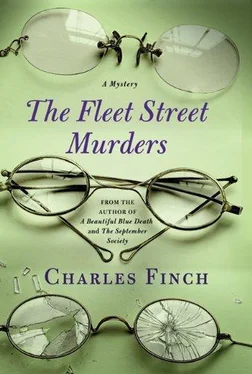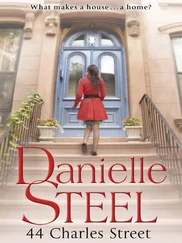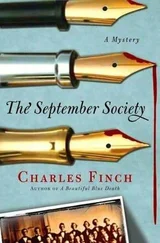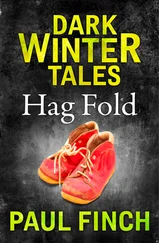Charles Finch - Fleet Street murders
Здесь есть возможность читать онлайн «Charles Finch - Fleet Street murders» весь текст электронной книги совершенно бесплатно (целиком полную версию без сокращений). В некоторых случаях можно слушать аудио, скачать через торрент в формате fb2 и присутствует краткое содержание. Жанр: Исторический детектив, на английском языке. Описание произведения, (предисловие) а так же отзывы посетителей доступны на портале библиотеки ЛибКат.
- Название:Fleet Street murders
- Автор:
- Жанр:
- Год:неизвестен
- ISBN:нет данных
- Рейтинг книги:5 / 5. Голосов: 1
-
Избранное:Добавить в избранное
- Отзывы:
-
Ваша оценка:
- 100
- 1
- 2
- 3
- 4
- 5
Fleet Street murders: краткое содержание, описание и аннотация
Предлагаем к чтению аннотацию, описание, краткое содержание или предисловие (зависит от того, что написал сам автор книги «Fleet Street murders»). Если вы не нашли необходимую информацию о книге — напишите в комментариях, мы постараемся отыскать её.
Fleet Street murders — читать онлайн бесплатно полную книгу (весь текст) целиком
Ниже представлен текст книги, разбитый по страницам. Система сохранения места последней прочитанной страницы, позволяет с удобством читать онлайн бесплатно книгу «Fleet Street murders», без необходимости каждый раз заново искать на чём Вы остановились. Поставьте закладку, и сможете в любой момент перейти на страницу, на которой закончили чтение.
Интервал:
Закладка:
“Third door on your second right,” she said and was off again.
Mr. Jeremy Moon, when Lenox knocked on the door of his office and pushed it open, was a gray-haired man with big round glasses and the beginnings of a paunch. He had discarded his jacket and rolled up his sleeves, and his hands were covered with ink. He was hard at work reading proofs.
“Who are you?” he asked rather rudely.
“Charles Lenox.”
Moon scowled. “I know that name. The detective, the Oxford murder. You appeared in our news section three consecutive days in September
… let me recall… was it the ninth, tenth, and eleventh?”
Lenox shrugged. “I’m not sure.”
“Of course, you may not read the Telegraph as attentively as I do,” said Moon with a short laugh. “How can I help you, then? I should mention that I’m rather short on time today. Are you any relation to the chap by your name who lost the election up north two days ago?”
“I’m him.”
“Are you! Blimey, you put yourself about. At any rate, as I say, I’m quite busy. How may I help you?”
“Are you doing the duties for which Winston Carruthers was generally responsible?”
“It’s about that, is it? I am, some of them. Others have fallen to our writers. He had a wide-ranging brief here, did Win.”
“I had taken a passive interest in the case before Inspector Exeter died, but now I find myself in a more active role and hoped to discover from you what I might about your colleague.”
“Well-what sort of thing?”
“Was he a genial man?”
Moon laid the proofs he had been reading down on his desk and pushed the big, round glasses from the bridge of his nose thoughtfully. “Yes,” he said. “After his fashion. He lived for his postwork drink, and here in Fleet Street he had a wide circle of friends. Carruthers was the sort of chap who could tell you at a moment’s notice all the particularities of some obscure government matter to do with-well, say one of the colonies, and break it down so it made perfect sense. He could write an article on a subject he knew nothing about in half an hour. Save for those rather remarkable qualities, he would have been fired long before his death.”
“Why?”
“He was indolent and, as I say, overfond of drink. Had a bad temper.”
“Did he have enemies, then?”
“Perhaps, but I don’t really think so-that sounds very sinister and all, but we lead pretty mild lives here, the pub aside, I promise you.”
“What was he working on before he died?”
“I’m not entirely sure, though I know in a general way. Because of his talent he was the only writer or editor we had who didn’t quite answer to me. He was a pet of our publisher, Lord Chance. I reserved space for his articles and ran an eye over them but never asked much beyond that.”
“What was he working on in a general way, then?”
“He had a story he had been working on for months about Gladstone-a profile of the rising man in the other party, you know.” Moon smiled. “We’re Conservative here, as you may know. Pleased to see Roodle get in, though you seem a decent chap.”
“What else?”
“Let me see-he had a story about the Royal Mint-one about Ascot-one about the new railroads-and probably half a dozen others whose premises he scribbled down somewhere.”
“Was he writing about crime, in any way? The gangs?”
“He may have been. I didn’t know about it.”
“Did he ever mention”-Lenox tried to think of a delicate way to say it-“any testimony he had given?”
Moon laughed. “The Poole thing? Only every day of his life. Which is how I happen to know that Gerald Poole killed him, Mr. Lenox. It’s our first lead tomorrow morning. I can promise you we’re taking Win’s death pretty seriously around here, and Poole’s involvement, too. He should swing for what he did.”
“Then who killed Inspector Exeter?”
“That’s why you’re here, I presume. To discover who Gerald Poole’s allies were, no?”
“Well,” Lenox murmured, unsure of what to say.
Moon nodded. “Take it as read, yes, that’s fine.”
“Did Carruthers ever mention Poole’s son to you?”
The answer to this question Lenox was destined never to get, for just then a bright-looking young man came in without knocking.
“Who’s he?” he asked Moon, pointing at Lenox.
“Nobody you can’t speak in front of. Why?”
“It’s the Carruthers thing.”
“What is it?”
“Winston Carruthers’s maid is back, Martha Claes. She says she assisted Poole every step of the way.”
CHAPTER THIRTY-SIX
The funeral of Police Inspector William Exeter took place in a small church near his home named St. Mary Abbots, a peaceful ground of ancient provenance that was perhaps to be rebuilt, according to someone Lenox overheard. Exeter had lived with his family in the Portobello Road, off of Notting Hill, and although it was in Kensington Lenox scarcely knew the area, which was spotted by hayfields and untouched meadows.
As soon as his carriage stopped, Lenox had a lump in his throat. He felt for his colleague some unlooked-for affinity that they had never shared in life. Perhaps it was because, whatever their two views of it had been, they did the same work, and it was work for which Exeter had died.
The inspector’s death was the great story of the day in the newspapers and the neighborhoods of London, and the trappings of his funeral combined what might have been normal for a man of his station and what might have been normal for a man of a much higher one. A long procession of empty carriages, sent by their illustrious owners, was passing the church, and from a respectfully gentle clatter nearby Lenox saw that the funeral line was to be quite grand. He himself was standing on a small patch of green earth near the front of the church, watching people amble in, generally of two types-Exeter’s relatives and his fellow officers of Scotland Yard-and occasionally of a third, more exalted type, whom Lenox could recognize by the black velvet breeches they wore, or the silver-headed cane they carried. These would be Members of Parliament and London officials. He saw the Lord Mayor arrive and make his way breathlessly up the steps of the church.
It was intensely sad to Lenox.
The service was short. There were two hymns and a eulogy from Exeter’s direct superior at the Yard before a speech by the church’s vicar. Lenox found himself sitting with Jenkins, somewhere in the back third of the pews, listening with half his mind and speculating about Exeter’s death with the other half.
Soon it was time for the standard procession between the church and the cemetery. On this no expense had been spared. First there were men on foot, an assortment of pallbearers in black, a series of young pages, and three mutes wearing black cloaks and carrying wands. All of these men, from the youngest lad to the oldest mute, were very certainly pickled to the gills on gin-a license of their profession, since they had to stand outside in the cold continually-but they did their duty solemnly.
Next came the funeral hearse, a grand black and silver object with gold trim everywhere, and following it a line of carriages full of Exeter’s friends and relatives. His widow, a handsome, dark-haired woman, had held up admirably well, and their young son was well dressed and well behaved.
“I have my carriage if you need a ride to the cemetery,” said Lenox to Jenkins.
“I must be getting back to town, in fact.”
“Look-do you think I could see Carruthers’s rooms, either today or tomorrow?”
Lenox had expected a difficult argument, but he got none. “Yes. Certainly.”
“Thanks.”
“Not at all. You’ve the unofficial license of the entire Yard behind you now; in fact, I was instructed to tell you as much. I was only just going to do so.”
Читать дальшеИнтервал:
Закладка:
Похожие книги на «Fleet Street murders»
Представляем Вашему вниманию похожие книги на «Fleet Street murders» списком для выбора. Мы отобрали схожую по названию и смыслу литературу в надежде предоставить читателям больше вариантов отыскать новые, интересные, ещё непрочитанные произведения.
Обсуждение, отзывы о книге «Fleet Street murders» и просто собственные мнения читателей. Оставьте ваши комментарии, напишите, что Вы думаете о произведении, его смысле или главных героях. Укажите что конкретно понравилось, а что нет, и почему Вы так считаете.












